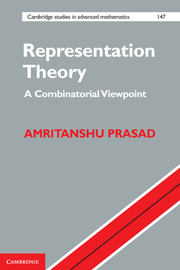Book contents
- Frontmatter
- Contents
- List of Tables
- Preface
- 1 Basic Concepts of Representation Theory
- 2 Permutation Representations
- 3 The RSK Correspondence
- 4 Character Twists
- 5 Symmetric Functions
- 6 Representations of General Linear Groups
- Hints and Solutions to Selected Exercises
- Suggestions for Further Reading
- References
- Index
1 - Basic Concepts of Representation Theory
Published online by Cambridge University Press: 18 December 2014
- Frontmatter
- Contents
- List of Tables
- Preface
- 1 Basic Concepts of Representation Theory
- 2 Permutation Representations
- 3 The RSK Correspondence
- 4 Character Twists
- 5 Symmetric Functions
- 6 Representations of General Linear Groups
- Hints and Solutions to Selected Exercises
- Suggestions for Further Reading
- References
- Index
Summary
This chapter contains a fairly self-contained account of the representation theory of finite groups over a field whose characteristic does not divide the order of the group (the semisimple case). The reader who is already familiar with representations, the group algebra, Schur's lemma, characters, and Schur's orthogonality relations could move on to Chapter 2. However, the treatment of these topics in this book may have some new insights for some readers. For instance, the reader will find a careful explanation of why it is that characters (traces of representations) play such an important role in the theory.
Representations and Modules
Let K be a field and G be a finite group. For a K-vector space V, let GL(V) denote the group of all invertible K-linear maps V → V.
Definition 1.1.1 (Representation). A representation of G is a pair (ρ, V), where V is a K-vector space and ρ : G → GL(V) is a homomorphism of groups.
Definition 1.1.2 (Multiplicative character). A multiplicative character of G is a homomorphism χ : G → K*. Here, K* denotes the multiplicative group of non-zero elements of K.
Example 1.1.3. The simplest example of a multiplicative character χ : G → K* is given by χ(g) = 1 for all g ∈ G. This is called the trivial character of G. A non-trivial character is any character that is different from the trivial character.
Each multiplicative character χ gives rise to a representation as follows: take V to be the one-dimensional vector space K and take ρ to be the homomorphism which takes g ∈ G to the linear automorphism of K, which multiplies each element by χ(g). Conversely, every one-dimensional representation comes from a multiplicative character. The representation corresponding to the trivial character of G is called the trivial representation of G.
[1] Exercise 1.1.4. Show that each multiplicative character of G contains [G, G] in its kernel (and therefore descends to a multiplicative character G/[G, G] → K*).
- Type
- Chapter
- Information
- Representation TheoryA Combinatorial Viewpoint, pp. 1 - 31Publisher: Cambridge University PressPrint publication year: 2015

